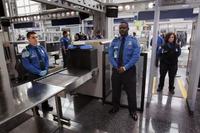-
Is Facelock the password alternative we’ve been waiting for?

One of the problems with using passwords to prove identity is that passwords that are easy to remember are also easy for an attacker to guess, and vice versa. Nevertheless, passwords are cheap to implement and well understood, so despite the mounting evidence that they are often not very secure, until something better comes along they are likely to remain the main mechanism for proving identity. But maybe something better has come along. Researchers propose a new system based on the psychology of face recognition called Facelock. But how does it stack up against existing authentication systems? The idea certainly sounds interesting and the technical challenges in implementing such a system do not seem great. But there are difficult questions regarding cost, selection and security of images that need to be answered before it becomes a practical alternative to passwords.
-
-
TSA expands PreCheck screening program to international airlines
The TSA is expanding its PreCheckscreening program to passengers on international airlines. Air Canada is the first international carrier to join the list of PreCheck carriers, which already includes several U.S. airlines.Some international airlines are reluctant to join the PreCheck carrier list because it entails upgrading their computer systems to print a PreCheck logo and embed PreCheck data in their boarding pass barcodes. With Air Canada joining the list, the TSA believes other foreign carriers with a large U.S. passenger base would benefit if they offered PreCheck status to their customers.
-
-
Forensic DNA technology could help identify abducted Nigerian girls
Forensic DNA technology developed in the aftermath of the 9/11 attacks could be used to identify and reunite more than 200 Nigerian girls who were kidnapped by Islamist militants, scientists said. The software, Mass Fatality Identification System (M-FISys), has been used worldwide — in Mexico, Guatemala, El Salvador, Honduras, Perú, Sri Lanka, the Philippines, Thailand, Malaysia, among several other countries — to identify and return more than 700 children who were abducted by criminals for child trafficking.
-
-
Using biometrics to protect India’s one billion people raises security, privacy concerns
The cutting edge of biometric identification — using fingerprints or eye scans to confirm a person’s identity – is not at the FBI or the Department of Homeland Security. It is in India. India’s Aadhaar program, operated by the Unique Identification Authority of India (UIDAI) and created to confirm the identities of citizens who collect government benefits, has amassed fingerprint and iris data on 500 million people. It is the biggest biometric database in the world, twice as big as that of the FBI. It can verify one million identities per hour, each one taking about thirty seconds. The program unnerves some privacy advocates with its Orwellian overtones.
-
-
The global passport security loophole: how serious is it?
More than one billion people are estimated to have travelled internationally in 2013, according to the UN’s World Tourism Organization. The International Civil Aviation Organization (ICAO), a United Nations body that regulates air transport worldwide, reported that around 3.1 billion people travelled by airplane in 2013. The numbers are immense. As a result, so too are the security challenges for airlines, immigration, and airport security agencies. The ICAO expects all of its 192 member countries to introduce machine-readable passports by 2015, but there is still no international deadline for the introduction of biometric passports. This means some people could be using old-fashioned passports until 2025. Even then, there is no absolute guarantee biometric passports are any more tamper-proof than a host of other computer-based security measures which apply to credit cards and customer databases.
-
-
Passports of millions of travelers to U.K. not thoroughly checked
The use of false passports by two passengers on Malaysia Airlines flight MH370 which disappeared a couple of days ago have highlighted the fact that in the United Kingdom, the passport details of more than twenty million people entering and leaving the United Kingdom every year are not being properly checked. The Home Office’s most recent figures show that data is still not being collected and examined for about 10 percent of the 200 million people flying in and out of the United Kingdom every year.
-
-
NIST report on iris aging flawed: researchers
In July last year, NIST released a report, titled “IREX VI: Temporal Stability of Iris Recognition Accuracy,” which concluded that its “best estimate of iris recognition aging” is so small that there should be no concern about the possibility of iris recognition accuracy degrading over time. University of Notre Dame biometrics researchers Kevin Bowyer and Estefan Ortiz have release a paper which points to errors in the NIST report on how iris aging affects the accuracy of iris recognition. They describe specific methodological errors in the NIST report, and present a list of suggestions to be addressed in a revised version of the report.
-
-
Longstanding forensic identification technique questioned
Forensic experts have long used the shape of a person’s skull to make positive identifications of human remains. Those findings, however, may now be called into question, since a new study shows that there is not enough variation in skull shapes to make a positive ID.
-
-
First no-fly list case goes to trial
Rahinah Ibrahim, dean of the architecture and engineering school at the University of Malaysia, took to trial on Monday her claim against the U.S. government for wrongfully listing her on the government’s no-fly list. Ibrahim has sought to clear her name since January 2005, when she was arrested at San Francisco International Airport. Similar lawsuits are pending across the country, but Ibrahim’s case is the first to go to trial. Ibrahim claims she was mistakenly placed on the no-fly list due to her national origin and Muslim faith.
-
-
Using keyboard, mouse, and mobile device “fingerprints” to protect data
Passwords are not secure because they can be hacked or hijacked to get at sensitive personal, corporate, or even national security data. Researchers suggest a more secure way to verify computer users and protect data: tracking individual typing patterns. The researchers are now working on developing ways to identify and track individual patterns of using a mobile device or a computer mouse.
-
-
Body of evidence: bodies offer cues for recognizing people
Computer recognition of people has focused almost exclusively on faces, but a new study suggests it may be time to take additional information into consideration. A new study describes a series of experiments that demonstrates there is potentially more valuable information for biometrics-based identity recognition in images of people than the face alone.
-
-
FBI mulling use of video recognition technology
The Federal Bureau of Investigation(FBI) is considering the use of video recognition technology to identify suspects in videos and still images based on facial and behavioral recognition. The proposed smart-video technology would scan crime scene footage against records of people, places, and objects to highlight possible suspects and their whereabouts.
-
-
Innovative technique to detect fingerprints
Researchers have developed an innovative product that uses fluorescence to detect fingerprints. This new product, Lumicyano, will make it possible to highlight fingerprints directly, more rapidly, and at a lower cost, avoiding the cumbersome processes required until now.
-
-
DHS finds no racial profiling at Logan Airport

An August 2012 allegation of racial profiling by Transportation Security Administration (TSA) officers sparked an investigation into the screening practices of TSA officers at Logan International Airport. DHS has recently concluded an investigation into allegations, and concluded that there was no evidence that TSA officers in Boston have been targeting minorities for additional screening to meet quotas.
-
-
Webcast of Forensic Handwriting Analysis Conference available online
On 4-5 June 2013 NIST and partnering organizations hosted the Measurement Science and Standards in Forensic Handwriting Analysis Conference. In case you missed this event or would like to view/listen again to the presentations, the archived video of the Webcast is now available online.
-
- All
- Regional
- Water
- Biometrics
- Borders/Immig
- Business
- Cybersecurity
- Detection
- Disasters
- Government
- Infrastructure
- International
- Public health
- Public Safety
- Communication interoperabillity
- Emergency services
- Emergency medical services
- Fire
- First response
- IEDs
- Law Enforcement
- Law Enforcement Technology
- Military technology
- Nonlethal weapons
- Nuclear weapons
- Personal protection equipment
- Police
- Notification /alert systems
- Situational awareness
- Weapons systems
- Sci-Tech
- Sector Reports
- Surveillance
- Transportation
Advertising & Marketing: advertise@newswirepubs.com
Editorial: editor@newswirepubs.com
General: info@newswirepubs.com
2010-2011 © News Wire Publications, LLC News Wire Publications, LLC
220 Old Country Road | Suite 200 | Mineola | New York | 11501
Permissions and Policies
Editorial: editor@newswirepubs.com
General: info@newswirepubs.com
2010-2011 © News Wire Publications, LLC News Wire Publications, LLC
220 Old Country Road | Suite 200 | Mineola | New York | 11501
Permissions and Policies
